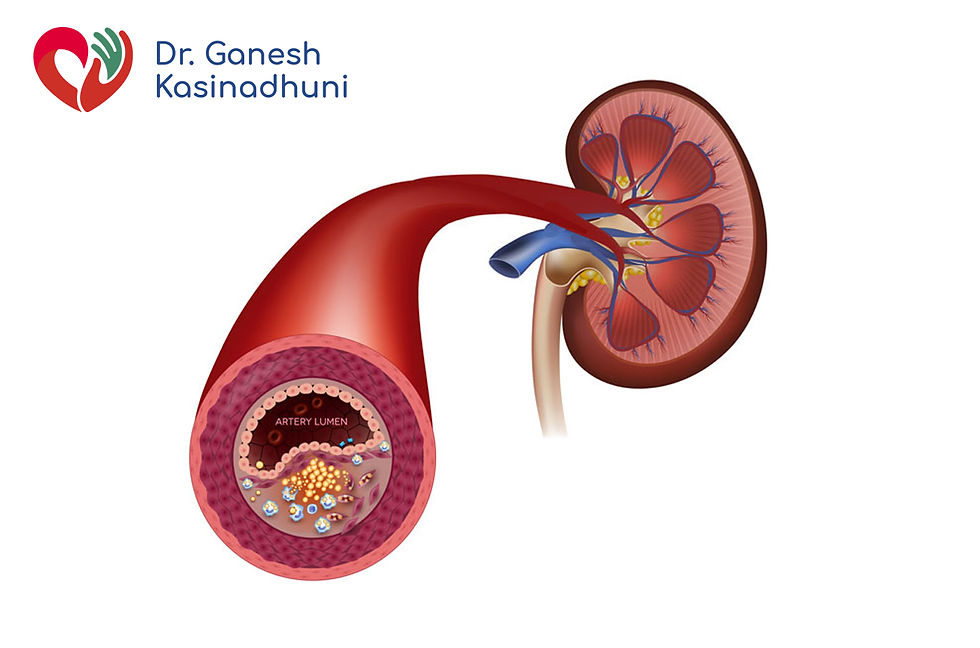Does Being Overweight Increase your Risk of Heart Attack?
- Shiftwave Technologies
- Apr 12, 2025
- 4 min read

In today’s fast-paced world, lifestyle choices are having a bigger impact than ever on heart health. Among the most concerning risk factors is being overweight or obese. But how exactly does extra weight increase your risk of a heart attack? Dr. Ganesh, widely regarded as the best cardiologist in Vizag, shares valuable insights into how obesity affects heart health and the advanced treatments available.
How Obesity Increases the Risk of Heart Attack
Being overweight isn’t just a matter of appearance—it’s a critical risk factor for heart disease. Carrying excess weight forces your heart to work harder. This increased workload over time leads to:
High blood pressure
High cholesterol levels
Type 2 diabetes
Systemic inflammation
All these conditions can accelerate the development of atherosclerosis, where fatty deposits (plaque) build up inside the arteries, restricting blood flow. If a plaque ruptures, it can trigger a blood clot that blocks the artery—resulting in a heart attack.
Obesity is also associated with sleep apnea, which causes breathing interruptions during sleep, leading to fluctuations in oxygen levels and increased stress on the heart.
The Science Behind the Risk
People who are overweight often have higher levels of inflammation in the body. This chronic inflammation damages the arteries, leading to the buildup of plaque. When a plaque ruptures, it can cause a blood clot, triggering a heart attack.
In such cases, heart attacks and stenting become lifesaving interventions. Dr. Ganesh specializes in complex stenting and OCT/IVUS imaging, which provides high-resolution images of the arteries, allowing for precise treatment even in the most complicated scenarios.
Advanced Treatments
In the case of a diagnosed blockage, stenting becomes a common solution to restore blood flow. But not all blockages are the same. Some are more complex, especially in patients with chronic obesity or diabetes. Dr. Ganesh specializes in complex stenting procedures that require advanced treatment.
In situations where traditional stenting may fall short—especially in heavily calcified or fibrotic plaques—advanced techniques are used:

1. Rotablation
This is a procedure where a rotating burr is used to grind away the hardened plaque, making way for a stent to be safely placed. It's particularly useful in high-risk patients with severe calcification.
2. Orbital Atherectomy
A more refined version, orbital atherectomy uses a rotating diamond-coated crown to remove tough plaque and ensure minimal damage to the vessel walls.
3. Intravascular Lithotripsy (IVL)
Inspired by kidney stone treatment, IVL delivers sonic pressure waves to crack the calcified plaque before placing a stent. This method is especially useful in elderly and overweight patients where artery flexibility is compromised.
These state-of-the-art techniques are performed by only a few top cardiologists in the region. Dr. Ganesh is among them, offering the best interventional care in Vizag for high-risk cardiac patients.
Carotid, Renal, and Peripheral Stenting
Obesity doesn’t just affect the heart—it also contributes to blockages in other vital arteries. Dr. Ganesh offers expertise in carotid, renal, and peripheral stenting to restore blood flow in affected areas and reduce the risk of stroke or kidney complications.
Heart disease in overweight individuals isn’t limited to the coronary arteries. Blockages can also occur in:
Carotid arteries – increasing the risk of stroke
Renal arteries – affecting kidney function
Peripheral arteries – causing leg pain and mobility issues
Dr. Ganesh offers carotid, renal, and peripheral stenting to restore proper blood flow in these critical arteries and prevent life-threatening complications. His expertise ensures comprehensive care beyond the heart.

Aortic Aneurysms in Overweight Individuals
An aortic aneurysm is a dangerous bulge in the main artery (aorta) that can rupture if left untreated. Being overweight increases the risk of developing aneurysms, particularly in the abdominal or thoracic regions.
Early detection through imaging and timely intervention is essential. Dr. Ganesh provides advanced minimally invasive procedures like:
Aortic stent placement
TEVAR (Thoracic Endovascular Aortic Repair)
EVAR (Endovascular Aneurysm Repair)
These interventions are life-saving and often preferred over open surgeries, especially for overweight patients who face higher surgical risks.
Weight Management for a Healthy Heart
While advanced treatments are available, prevention is always better than cure. Managing weight through a balanced diet, regular physical activity, stress management, and routine checkups can reduce your risk of heart attack drastically.
Dr. Ganesh works with a multidisciplinary team that includes dietitians, physiotherapists, and diabetic educators to help patients with obesity regain control over their health.
When to See a Cardiologist
You should consult a cardiologist if you experience:
Unexplained chest pain or discomfort
Shortness of breath with minimal exertion
Swelling in the feet or ankles
Palpitations or irregular heartbeat
Family history of heart disease
If you’re overweight and have one or more of these symptoms, early screening can make all the difference. With his expertise in complex stenting, advanced imaging, and aortic repairs, Dr. Ganesh provides comprehensive and personalized heart care in Vizag.

Why Dr. Ganesh is the Best Cardiologist in Vizag
Expertise in Advanced Cardiac Interventions
Pioneer in Rotablation, Orbital Atherectomy, and IVL
Specialist in OCT/IVUS Imaging for accurate diagnosis
Trusted name for carotid, renal, peripheral, and aortic stenting
Patient-first approach with holistic heart failure care
Conclusion
Don’t let weight silently increase your risk of a heart attack. Early intervention, lifestyle changes, and expert care can make all the difference.
Schedule a consultation with Dr. Ganesh – the best cardiologist in Vizag – and take the first step toward safeguarding your heart.




Comments